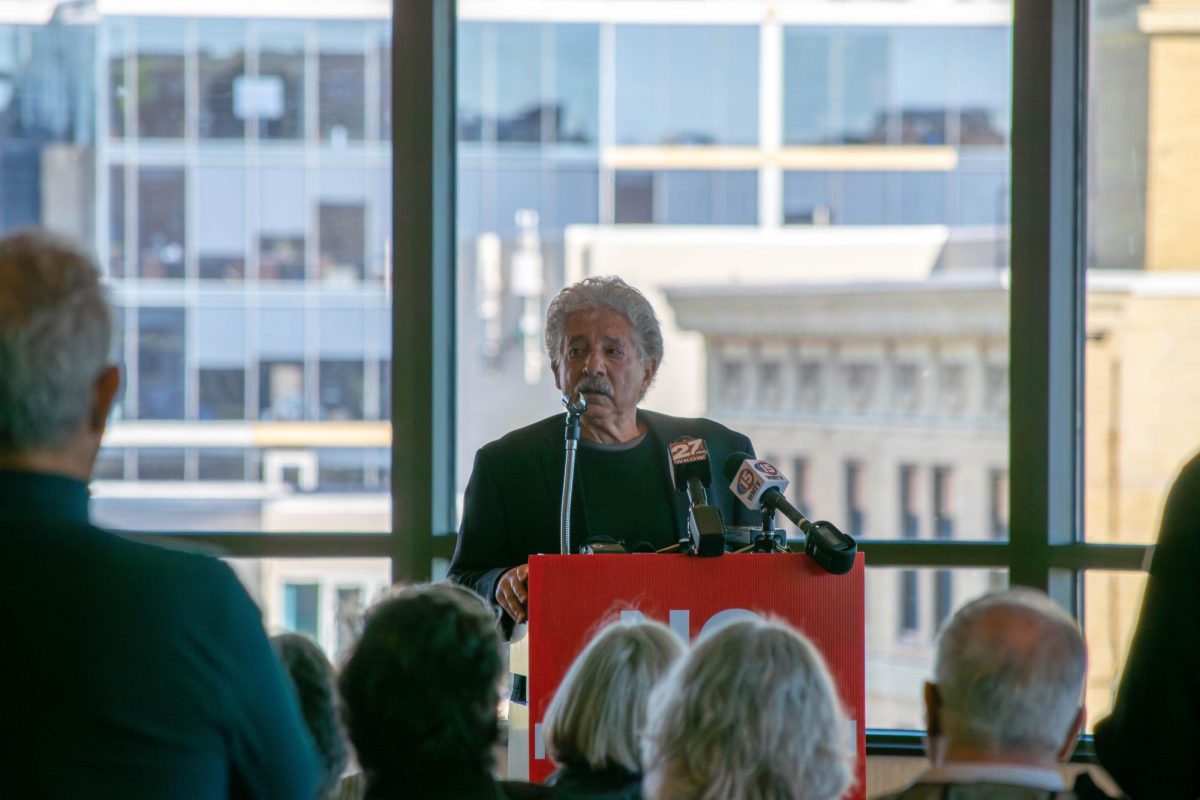Former Madison Mayor Paul Soglin, former District 14 Alder Sheri Carter and former Dane County Sheriff Dave Mahoney held a press conference Wednesday afternoon encouraging Madison residents to vote “No” on the upcoming property tax referendum.
If the referendum is passed, Madison would avoid significant reductions to city services in 2025 and deeper cuts to future operating budgets, according to the city’s website.
Soglin began the conference by criticizing the leadership choices of Mayor Satya Rhodes-Conway. Soglin said her administration should increase lobbying efforts to obtain state aid.
Soglin recalled how when he was mayor, Madison spent more than double the hours it currently does lobbying the state government, and that he was able to effectively collaborate with Republicans on legislation pertaining to the city.
“I raise this because the defeatist loser attitude that we cannot get any successful results from the state legislature has to go,” Soglin said at Wednesday’s press conference. “Nobody deserves to be in public office representing this city and this county, if they’re going into it with the attitude that Robin Vos is an impossible impediment to the city and the county doing better.”
Soglin praised the “very good citizens” at the conference who had requested public records showing the wide disparity between lobbying efforts from the city governments of Milwaukee and Madison.
During the conference, Madison real estate agent Alex Saloutos handed out pamphlets and information from his blog, which details Saloutos’ opinions on issues facing the city.
As of 2024, the City of Milwaukee receives $407 in state funding per resident, more than twice the statewide average of $195 per resident, while Madison receives only $29 per resident, according to the Wisconsin Policy Forum.
Soglin suggested the city devote more resources to lobbying the state government for increased aid instead of raising property taxes for residents. Soglin said Madison can use its $16 million investment surplus from 2023 and the $7 million investment surplus so far from 2024 to continue funding city services.
“There is no need next year for any cuts,” Soglin said.
One of the city’s reasons for calling the referendum is the need to hire more staff as Madison’s population grows, which Soglin said is contrary to how a city should operate.
“What happens when you have a city is you get the efficiencies, the economies of density, and you do not need a proportional increase to proportion population increase,” Soglin said.
Carter spoke of her worries about how the proposed increase in property taxes will affect Madison’s lower-income residents.
“Over half our children in the school system qualify for free or reduced lunch,” Carter said. “Can their families be generous with this referendum? Should they have to choose between the lights and saving the city?”
Carter said the city’s elected officials need to look beyond “pet projects” and not shift Madison’s financial burdens onto the backs of citizens. According to Carter, the city should work on creating a financially sound budget in order to prevent Madison residents from facing the choice of higher property taxes or a reduction in services.
“There are no elves in the basement pumping out money,” Carter said.
Mahoney said he is a part of the “No” vote due to concerns about transparency and fiscal responsibility in city budgeting.
Mahoney said Rhodes-Conway administration’s proposal to reduce the police and fire departments’ budgets if the referendum fails places the city “in a bit of a pickle” in regards to 2023 Wisconsin Act 12, which mandates consistent local funding of law enforcement, fire and emergency medical services.
If these requirements aren’t satisfied, the city could lose 15% of the shared revenue received from the state, Mahoney said.
“All of our citizens are in jeopardy of the impact of the loss of 15% of shared revenue in 2025,” Mahoney said.
In his closing statement, Soglin further criticized the budgetary choices of Mayor Rhodes-Conway, saying that the city pays the salaries of nonprofit CEOs who make up to $545,000 a year.
“I think it’d be more fun if everybody went out and did their own research,” Soglin said when asked about which organizations he was referring to.
Soglin did not comment on questions about the Madison school referenda, and there are disagreements between people at the conference about the issue.
“We’re not real well organized, but we’re dedicated,” Soglin said.



